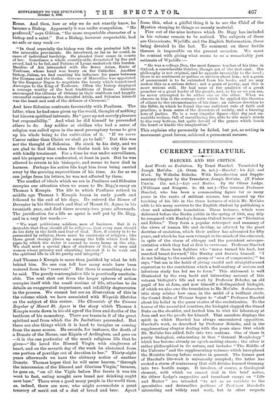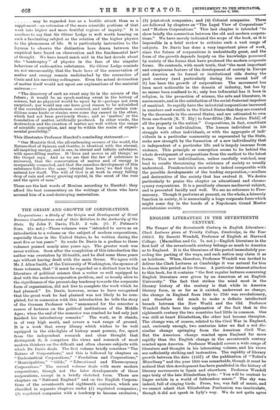• CURRENT LITERATURE.
HAECKEL AND HIS CRITICS.
Last Words on Evolution. By Ernst Haeckel. Translated by Joseph McCabe. (A. Owen. 6s. net.)—Haeckel: his Life and Work. By Wilhelm Mischa. With Introduction and Supple- mentary Chapter by the Translator, Joseph McCabe. (T. Fisher Unwin. 15s. net.)—Life and Matter. By Sir Oliver Lodge. (Williams and Norgate. as. 6d. net.)—The veteran Professor Haeckel, who has been a commanding figure for so many years in the ranks of militant science, has summed up the teaching of his life in the three lectures of which Mr. McCabe adds to his many services to the English student by publishing a clear and admirable translation. These lectures, which were delivered before the Berlin public in the spring of 1905, may fitly be compared with Huxley's famous Oxford lecture on "Evolution and Ethics." They form a popular retrospect and summary of the views of human life and destiny, as affected by the great doctrine of evolution, which their author has advocated for fifty years, and which he has seen triumph in the minds of the educated, in spite of the storm of obloquy and the persistent misrepre- sentation which they had at first to overcome. Professor Haeckel is one of those born fighters who "never turned his back, but marched breast forward," like ,Hutley and Darwin himself. "I do not belong to the amiable group of men of compromise,'" he says, "but am in the habit of giving candid and straightforward expression to the convictions which a half-century of serious and laborious study has led me to form." This statement is well illustrated by the very lucid and interesting account of this veterak biologist's life and work by Professor Mischa, an old pupil of his at Sena, and now himself a distinguished biologist, of which we also owe the translation to Mr. McCabe. A character- istic story relates how once, iti the midst of a brilliant circle, the Grand Duke of Weimar began to " chaff " Professor Haeckel about his belief in the queer stories of the evolutionists. To the horror of the assembled courtiers, the biologist slapped the Grand Duke on the shoulder, and invited him to visit his laboratory at Jena and see the proofs for himself. That anecdote displays the spirit in which Haeckel has always encountered opposition. rfa.eckers work, as described by Professor Mischa, and in the supplementary chapter dealing with the years since 1900 which Mr. McCabe has added, falls into two sections. One of these is purely biological, culminating in that "General Morphology" which has become already an epoch-making classic ; the other is rather philosophical in its nature, and includes "The Riddle of the Universe" and the supplementary volumes which have placed the Monistic theory before readers in general. The former part of Haeckers life-Work is universally accepted ; the latter has evoked a storm of controversy that still divides learned Germany into two hostile camps. It involves, of course, a theological element, with which we cannot deal in this brief notice. Sir Oliver Lodge's suggestive and trenchant essaye oti "Life and Matter" are intended "to act as an antidote to the speculative and destructive portions of Professor llaeckers interesting and widely read work, but in other respects
may be regarded less as a hostile attack than as a supplement—au extension of the more scientific portions of that work into higher and more fruitful regions of inquiry." It is needless to say that Sir Oliver Lodge is well worth hearing on such a fascinating subject as the relation of the higher physics to the phenomena of life It is particularly instructive to the layman to observe the distinction here drawn between the empirical laws based on observation and the fundamental laws of thought. We have heard much said in the last decade about the " bankruptcy " of physics in the face of the singular behaviour of radio-active substances. Sir Oliver Lodge reminds us, not unseasonably, that the basic laws of the conservation of matter and energy remain undisturbed by the researches of Curie and his surviving colleagues. Even the actual destruction of matter itself would not upset our explanations of the material universe :— " The discovery of such an event may lie in the science of the future ; it would be an epoch-making event in the history of science, but no physicist would be upset by it—perhaps not even surprised; nor would any one have good reason to be astonished if the correlative phenomenon occurred, and under certain con- ditions some knots or strains were some day caused in the ether, which had not been previously there; and so 'matter,' or the foundation of matter, artificially produced. In other words, the destruction and the creation of matter are well within the range of scientific conception, and may be within the realm of experi- mental possibility."
This illustrates Professor Haeckel's concluding statement :— " Our Monistic God, the all-embracing essence of the world, the Nature-God of Spinoza and Goethe, is identical with the eternal, all-inspiring energy, and is one, in eternal and infinite substance, with space-filling matter. It lives and moves in all things,' as the Gospel says. And as we see that the law of substance is universal, that the conservation of matter and of energy is inseparably connected, and that the ceaseless development of this substance follows the same 'eternal iron laws,' we find God in natural law itself. The will of God is at work in every falling drop of rain and every growing crystal, in the scent of the rose and the spirit of man."
These are the last words of Monism according to Haeckel : they afford the best commentary on the writings of those who have accused him of a soul-destroying materialism.































































 Previous page
Previous page